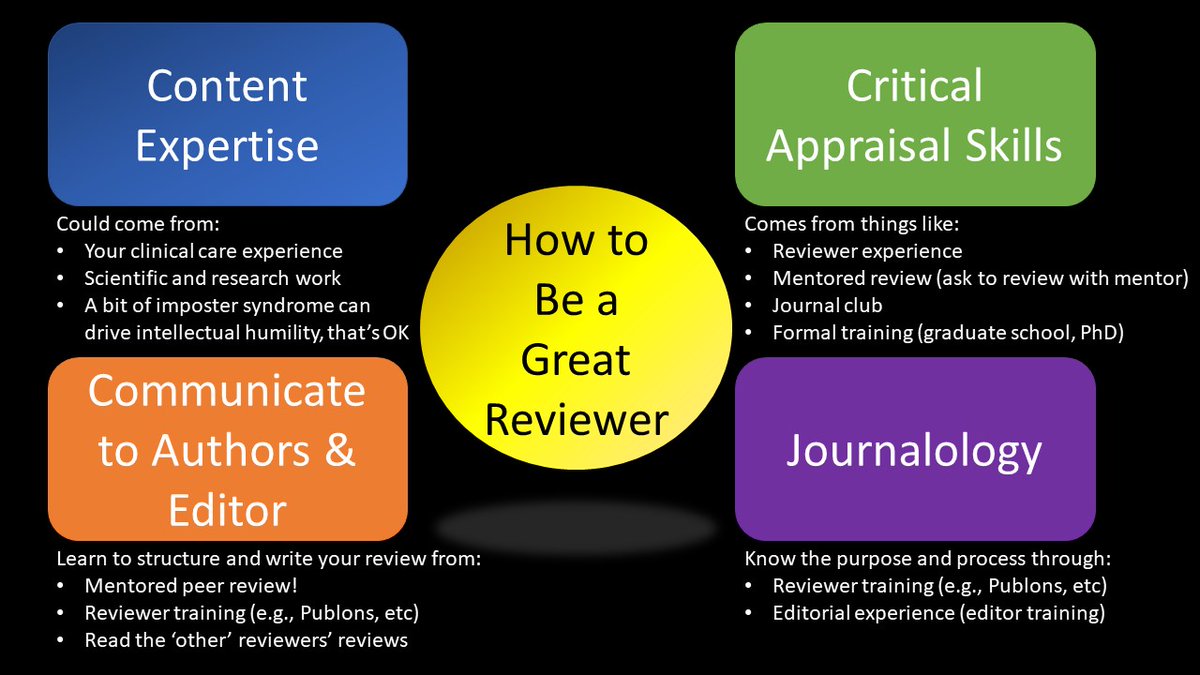
Loved Session #2 ("How to Peer Review") of the new Scholarly Writing Workshop Series with @GreenJournal #RFS where we are improving how authors' write by understanding perspectives of the editor, reviewer, & reader.
Top🔟take away's on writing better by reviewing better in 🧵👇
Top🔟take away's on writing better by reviewing better in 🧵👇

#1 How to Be a Great Reviewer:
1⃣Expertise: gotta have it; even experts have imposter syn-cultivate uncertainty in yourself
2⃣Critical Appraisal: comes w/ time, experience, mentored reviews
3⃣Communicate: how to write & structure your review
4⃣Journalology: know purpose & process
1⃣Expertise: gotta have it; even experts have imposter syn-cultivate uncertainty in yourself
2⃣Critical Appraisal: comes w/ time, experience, mentored reviews
3⃣Communicate: how to write & structure your review
4⃣Journalology: know purpose & process

#2 How to Get Involved in Peer Review as MD:
-Start w/ clinical case reports (what you know)
-Get involved w/ journals you know & submit to
-Raise your hand: email journal/editor w/ interest & expertise
-When you get it, do it now
-Do first reviews REALLY well
-Mentors = critical
-Start w/ clinical case reports (what you know)
-Get involved w/ journals you know & submit to
-Raise your hand: email journal/editor w/ interest & expertise
-When you get it, do it now
-Do first reviews REALLY well
-Mentors = critical
#3 How to Write a Review
-Write short summary of the article, importance in the literature, strengths, weaknesses
➡️Helps you see the BIG picture
➡️What is new?
➡️Will it advance the field?
-Then go section-by-section
-Title, abstract, & first concluding paragraph=🗝️; re-read 'em
-Write short summary of the article, importance in the literature, strengths, weaknesses
➡️Helps you see the BIG picture
➡️What is new?
➡️Will it advance the field?
-Then go section-by-section
-Title, abstract, & first concluding paragraph=🗝️; re-read 'em
#4 ❓By Section
-Intro:what is the research question? Do you even want to know the answer?
-Methods:can someone replicate this?
-Results:reported as stated? Or not! Fig's must stand alone. Stats=IMPT.
-Discussion:findings put in context? Beware: over-concluding, underreferencing.
-Intro:what is the research question? Do you even want to know the answer?
-Methods:can someone replicate this?
-Results:reported as stated? Or not! Fig's must stand alone. Stats=IMPT.
-Discussion:findings put in context? Beware: over-concluding, underreferencing.
#5 Comments to Editor
- Put the paper in context
- What is the reason for your recommendation?
- Report any conflicts/disclosures
- Acknowledge any help you received/sought
- Are there add'l reviewers that might be helpful?
- Put the paper in context
- What is the reason for your recommendation?
- Report any conflicts/disclosures
- Acknowledge any help you received/sought
- Are there add'l reviewers that might be helpful?
#6 Comments to Author
-Reviewer is an umpire; calling balls & strikes
-Be impartial
-Be constructive
-Do not comment on accept/reject
-Ask authors to explain their rationale: what is new about this? How does it advance the field? Why did you select this method?
-Make paper better
-Reviewer is an umpire; calling balls & strikes
-Be impartial
-Be constructive
-Do not comment on accept/reject
-Ask authors to explain their rationale: what is new about this? How does it advance the field? Why did you select this method?
-Make paper better
#7 How do You Review References
-Do your own lit search to understand the literature
-As you develop expertise; was the authors' interpretation of a paper=same as yours?
-Are refs primary literature (good) or review articles (bad)
-Sloppy references break reviewer trust;big no-no
-Do your own lit search to understand the literature
-As you develop expertise; was the authors' interpretation of a paper=same as yours?
-Are refs primary literature (good) or review articles (bad)
-Sloppy references break reviewer trust;big no-no
#8 Do's & Don'ts to Reviewing
-DO
➡️Summarize paper, put it in context
➡️Identify weaknesses & strengths
➡️Add articles that support your position
➡️Be constructive
-DO NOT
➡️Recommend accept/reject
➡️Repeat your Comments to Author, to the Editor
➡️Overlook title, abstract, refs
-DO
➡️Summarize paper, put it in context
➡️Identify weaknesses & strengths
➡️Add articles that support your position
➡️Be constructive
-DO NOT
➡️Recommend accept/reject
➡️Repeat your Comments to Author, to the Editor
➡️Overlook title, abstract, refs
#9 Top Reviewer Irks
-Claims of primacy: it is NOT helpful for authors to state that they are the first
-Overinterpretation of data
-When data in the abstract does not match article
-When you are at the end of the abstract and can't tell what was done in the study
-Claims of primacy: it is NOT helpful for authors to state that they are the first
-Overinterpretation of data
-When data in the abstract does not match article
-When you are at the end of the abstract and can't tell what was done in the study
#10 What Reviewers Love
A paper that truly advances the field ...
A paper that truly advances the field ...
So many great insights from #BobGross @URMC_Neurology, @LBGoldsteinMD, #SteveGaletta @NYUneurologyres, @drdrariel and tremendous discussion with @GGheihmanMD #DanTalmasov, @Katha_MD @narologist @aszelikovich @nkhalil10 & #NeurologyRF @Raphael_BrdVlt @KatherineFuMD @SabaJafarpour
• • •
Missing some Tweet in this thread? You can try to
force a refresh




